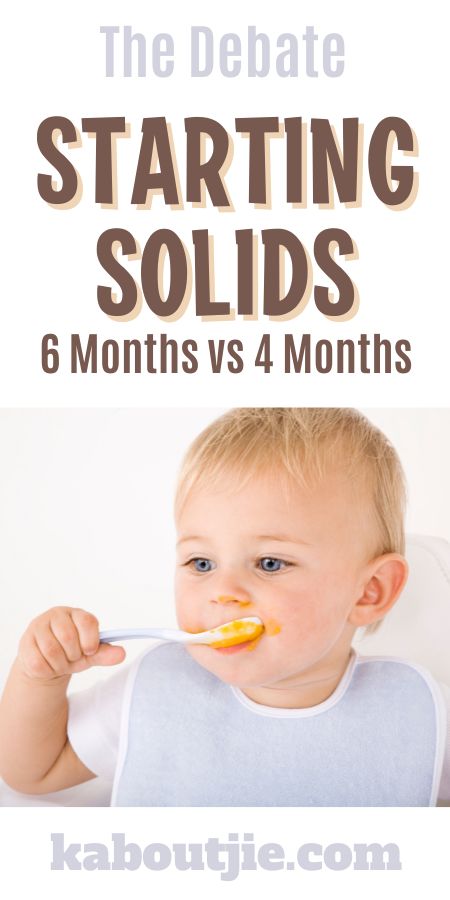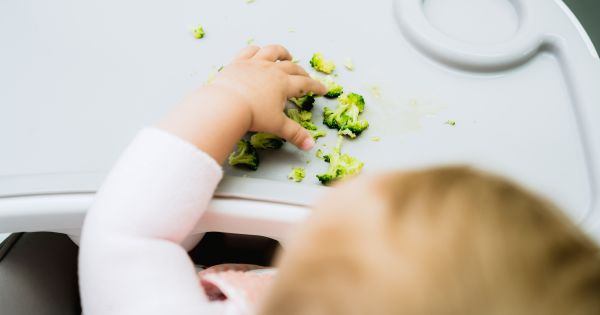Introducing solid foods to your baby is an exciting milestone for both you and your little one. It’s a sign that they’re growing and developing, and it’s a step towards greater independence. Typically, babies start to show an interest in solid foods between 4 and 6 months of age, as they observe and mimic the eating habits of those around them. This is a good time to start introducing complementary foods to their diet.
***Disclosure -The links in this post may contain affiliate links and I may receive a small commission if you make a purchase after clicking on a link.***

The American Academy of Pediatrics and World Health Organisation recommend that babies be exclusively breastfed for the first 6 months of life. Breast milk or infant formula provides all the necessary nutrients and calories during this time. However, some babies may be ready for solid foods earlier or later than 6 months. It’s important to watch your baby’s cues and development rather than relying solely on the calendar.
When it comes to introducing solid foods to your baby, timing is key. Starting too early (before 4 months) can lead to choking hazards and a decrease in breast milk consumption. However, waiting too long (after 7 months) may increase the risk of developing allergies. It’s important to find the right window of opportunity to start solids and consult with your paediatrician for guidance.
Why Waiting Until 6 Months Is Best
It is recommended to wait until your baby is at least 6 months old before introducing any foods or fluids other than breastmilk. This is because introducing solids too early can increase the risk of illnesses such as diarrhoea, which can be dangerous for your baby’s health. Additionally, introducing solids too early may cause your baby to breastfeed less often, which can decrease your milk supply, which is crucial for your baby’s nutrition.
When it comes to introducing solids to your baby, it’s important to keep in mind that their digestive system is still developing. Breast milk is the best source of nutrition for your baby in the first few months of life. Introducing anything other than breast milk, including formula, can have negative effects on your baby’s gut microbiota and lead to issues like necrotising enterocolitis, diarrheal disease, and allergies. It’s important to wait until your baby is developmentally ready and to introduce solids slowly and carefully.
While breast milk is the recommended source of nutrition for the first six months of life, some mothers may struggle to produce enough milk or choose not to breastfeed. In these cases, formula can be a healthy alternative for your baby. To support your baby’s immune and gut function, consider adding probiotics to their formula. Remember, every baby is different and it’s important to consult with your paediatrician before making any changes to your baby’s diet.
The Effect On Long-term Health
Delaying the introduction of solid foods until your baby is 6 months old can have long-term health benefits. Breastmilk provides important benefits such as reducing the risk of obesity, diabetes, respiratory and ear infections, and Sudden Infant Death Syndrome (SIDS). When infants start eating solid foods, they may consume fewer calories from breastmilk and miss out on these benefits. Breastfeeding also leads to fewer doctor visits, hospitalisations, and prescriptions, according to the CDC.
Better Immune System
Breastmilk offers a unique advantage in that it is tailored to each individual baby, providing customised protection against harmful germs. When a baby is exposed to a new germ, the mother’s body produces antibodies to fight it off, which are then passed on to the baby through breast milk. Research has shown that these antibodies can improve the baby’s intestinal immune system, providing long-lasting benefits well into adulthood. Therefore, introducing solids to a baby should be done with caution and in consultation with a paediatrician to ensure that the baby’s immune system is not compromised.

Prevention Of Allergies
Research has shown that introducing solid foods to a baby before six months of age can increase the risk of food allergies, especially in families with a history of them. Breastfeeding exclusively for the first six months can significantly reduce this risk and also lower the chances of developing skin sensitivities such as eczema. It is important to consult with a paediatrician before introducing solid foods to ensure the baby is developmentally ready.
Higher IQ
Research has shown that introducing solids to a baby’s diet too early can have negative effects on their health and development. Breast milk contains essential nutrients and fatty acids that aid in brain development. In fact, a study found that exclusively breastfed babies had an average IQ that was 3.8 points higher than those who were not exclusively breastfed. This highlights the importance of providing babies with the best possible nutrition during their early stages of life.
Your Milk Supply
When it comes to introducing solids to your baby, it’s important to remember that breast milk should still be their primary source of nutrition until they are at least 6 months old. Introducing solids too early can put your milk supply at risk, as your baby may start to rely less on breast milk for their calories and nutrients. So, keep nursing as much as possible to maintain your milk supply and wait until your baby is ready for solids before making any changes to their diet.
 Kaboutjie SA Mommy Blogs by Lynne Huysamen
Kaboutjie SA Mommy Blogs by Lynne Huysamen





Very interesting!! I think baby-led weaning is great!
Haha that’s so cute. My husband kept feeding our boy chocolate when I was’nt looking. He still denied it even after I saw the chocolate drool on his bib.lol there was even a time when there was red drool (from a jelly baby) we officially started giving rice porridge at about 5 months (I was bullied by mom in law):)
Yes just found out our nearly 1 year old has been given coke by hubby too! I gave him a sip of my coke a few days ago thinking it was his first sip and my boy loved it. When I told hubby he said yes, he knows he loves coke…. he has been giving him some for a while now lol. Naughty naughty.
I started feeding my son at around 5 months but he played with the food more. By 7 months he was feeding himself mostly. His hand eye coordination is great. He now eats like a horse. Has his days where he eats more than me. I do however try to limit his sugar and carb intake
Hi Vanessa
Yes my son was also eating loads as a baby and now that he is 2 1/2 he eats loads some days and other days close to nothing. Right now all he wants is jam sandwiches breakfast, lunch and supper! I know this is just phase as my daughter went through it too. She is now nearly 5 years old and she eats very well. She eats her veggies and mostly whatever I put in front of her.
My first son we started on 15weeks with solids! And today he is 4 and a half and eats everything!!! The second one we started on 12 weeks already. On 14 weeks he was sitting by himself already and he ate sweet patato this morning and loved it!!!
I loved starting my babies on solids too Tanya, what a fun experience! My daughter and son also had sweet potato as a firm favourite 🙂
Love the smartie part..lol..cute.my 1st son now 12…was 4,4 kg at birth..didnt breadtfeed..( dont know why..was only 21..I tried but will have him on ine boob for like 40 min and then he was still hungry..but any way..he wad a big baby..so I started rice cereal on 3 months..he weighted then 8,5 kg..my 2nd daugthet I breastfeeded for 9 months with NO Solids..yes thats right and she was a chubby little one…she’s now 10..and the 3rd one now 5 months( asked my husband how did I got pregnant how did it happend) lol I tried to pushed it to 6 months because of the debut..and health stories..but she grabbed my sandwich out of my hand starting to eat at about 4 and a half months..so I gave her solids..:)
Really wanted to start solids at 6months but my baby’s got bad reflux so dr said i must start at 4months with rice cereal.
Cant wait to see her eat for the first time!!!
Marisca it is a really exciting milestone, but just keep in mind your baby won’t eat much to start with 🙂
My daughter also had reflux. Did not pick up enough weight. Started her at 3 months on butternut as per advice of our pead. Reflux disappeared around 6 months. Now 4years old and eats anything!
Shame Marinelle, it is so awful when our babies struggle with things like reflux. Its great that your daughter is a good eater now.
I believe food before 1 is just for fun. I did baby lead weaning with my other kids and will be doing again. I waited with all my kids till 6months when they were ready.
Marina with my first baby I followed the paediatrician’s advice to start solids at 4 months with cereal and puree, but with my second baby I had learned more and started with baby-led weaning at 6 months and I think it is much better. I find it odd that the paediatrician said to start at months with my daughter when all the information online that I saw afterwards says to wait until 6 months!
We started with solids and wow how cute!!!
Rice cereal in the mornings and vegetable purity in afternoons and she keeps it in. Not throwing up the food but milk still.
Hope it will get better soon.
Hi Lynne i say when mommy see baby is ready why not i started my son now on 4 and half months he enjoy it make him healthy steamed veggies and rice cereal in morning and no struggle his not even done swollowing the he open for next…
Mine is 15 weeks and started and he loves it ped also advised to start at 16 weeks he is already double he’s birth weight which is 8 kg he is fine my 3rd boy now
My son started when he was 4months old